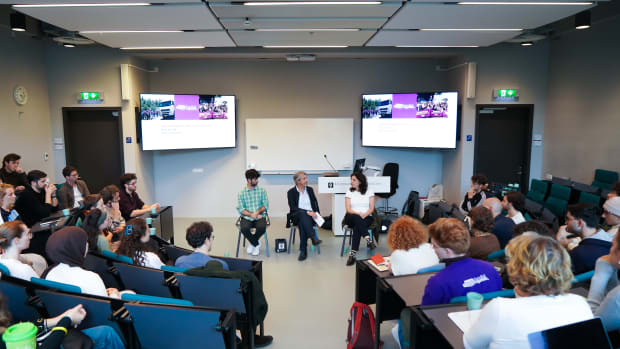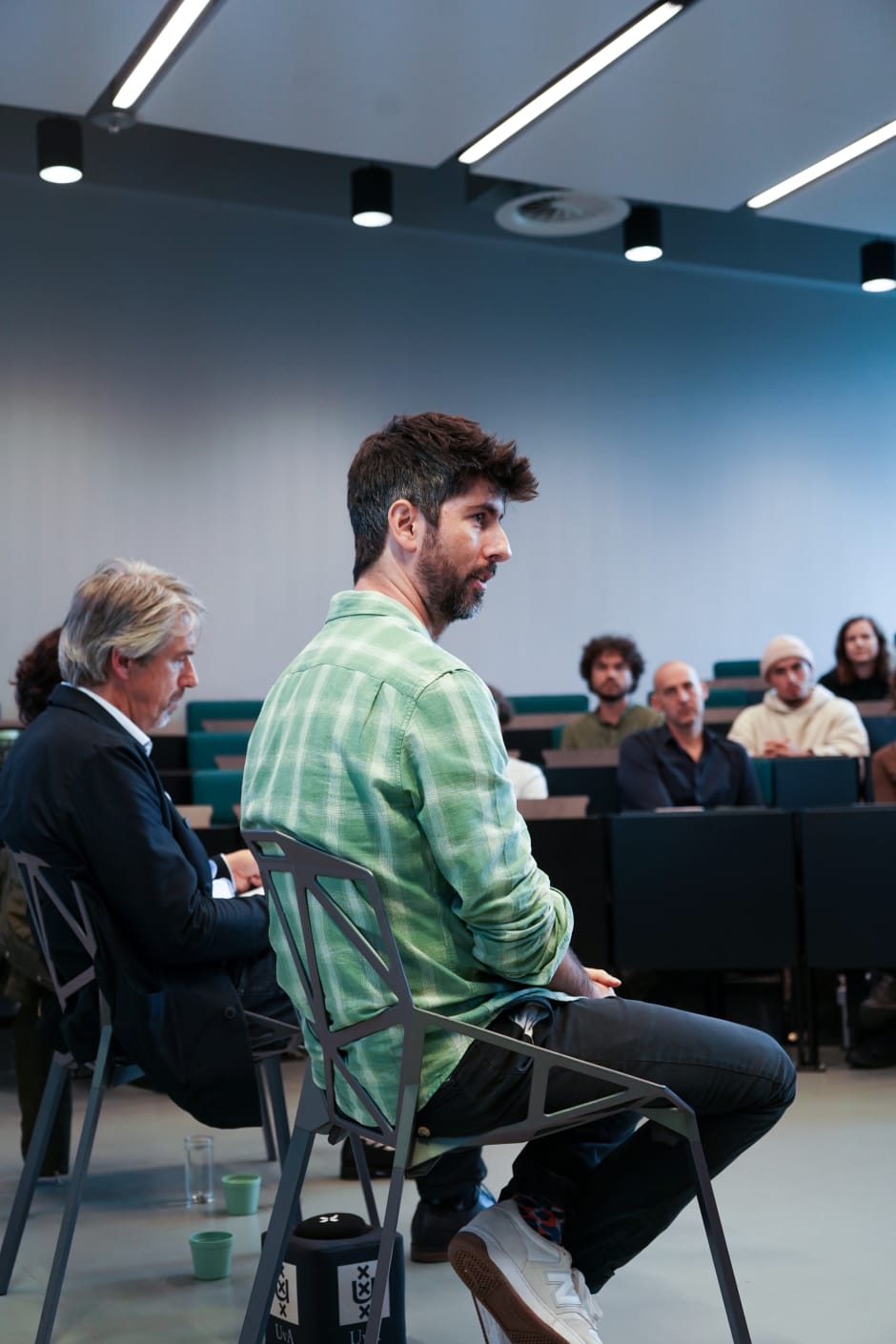
A Jewish activist and a Palestinian activist from Israel speak on peace at UvA
On Wednesday afternoon, founders of the Jewish-Palestinian movement Standing Together were guests at the UvA. They call for immediate peace and cooperation of Jews and Palestinians, without boycotting individuals. ‘‘Both Jews and Palestinians will never leave here. So we'd better have peace as soon as possible.’’
The movement’s directors, Jewish Alon-Lee Green and Palestinian Rula Daood, are campaigning for peace, an end to Palestinian oppression and security for both peoples in Israel. ‘‘We seek similarities between Jews and Palestinians, and want to bring people back together through empathy for eachother’s grief,’’ Green explained.
On Tuesday, the founders and also administrators of the movement were at debate podium de Balie, Thursday afternoon they will speak to the foreign affairs committee of the Dutch parliament. In REC A2.17 yesterday, over 50 people, including board chair Edith Hooge, listened attentively to the two speakers. The high turnout was all the more remarkable because pro-Palestinian, Israeli professor Neve Gordon was also due to speak at the UvA later in the evening.
Jewish Israeli Alon-Lee Green was politically active in his country from an early age. As a teenager, he founded the waiters’ union, which campaigned for minimum wages for waiters. Later, he was a political adviser in the Israeli parliament and one of the protest leaders of the social justice demonstrations in 2011.
Palestinian Israeli Rula Daood only became politically active since the 2014 Israel-Gaza war. She quit her job, spoke out against the right-wing government on several occasions and, together with Green, became a director of Standing Together in 2019.
That organisation of Jewish and Arab Israelis, co-founded by Green, has been pushing for cooperation between Jews and Palestinians since 2015. The 5,300-member movement previously spoke out against political detentions, the destruction of Arab villages and the new radical-right government. Since the 2023 Israel-Hamas war, the anti-war group has been organising constant pro-arms ceasefire protests.
War in Lebanon and Gaza
As amiable as the meeting began, Green and Daood’s day began on a heavy note. At 5.14am in Amsterdam, the two were woken up by an alarm on their phones. Their mobiles were still set to Tel Aviv, where people were being warned by the government of a Hezbollah missile attack. That Lebanese movement was attacked domestically by Israel in recent days. At least 600 people were killed in the process. “There is fear in the north again,” declared Daood, herself from northern Israel.
Above all, Standing Together opposes war, both in Gaza and Lebanon. For one thing Palestinian and Jewish Israelis have in common anyway, according to Palestinian Daood: “All our lives are terribly affected by this.” Daood lost family in Gaza and has many friends who lost family in the Hamas attack on 7 October. Green’s acquaintances also died in the war. And so Daood asks the audience, “who benefits from this?” She wants to make Israelis, Palestinian and Jewish, aware that they are united in their war suffering.
Just days after the attack on 7 October, Standing Together took to the streets in Israel to demonstrate, says Jewish Green in the lecture hall. The action group called for a deal to release the hostages and for a ceasefire, as they said bombing innocent civilians in Gaza would not help anyone. Green continued: “For example, when Israeli settlers blocked trucks carrying aid for Palestinian civilians, hundreds of members of Standing Together went arm in arm between the trucks and the settlers. That’s how humanitarian aid eventually reached Gaza after all.”
Role of university
Keestra then explained to the Israeli activists that the university itself is also struggling with its role in the conflict. President of the Board of Governors Hooge hopes mainly to “listen to the different views here”, but she will take those views into account in her decision-making. For instance, the university is meeting about a new ethical framework, the current collaborations with Israel have been discussed with staff and students and a large pro-Palestine demonstration took place at the UvA last 13 September.
“Yes,” says a student in the room, “what can we Dutch people actually do?” Green is happy to answer that. “First, boycott Israeli institutions that collaborate in the genocide of Palestinians. The Israeli arms industry, the settlements on the West Bank, even this Israeli government, but not all academics. Most importantly: like Slovenia, Ireland and Spain, recognise the state of Palestine.”

Boycott
Green turns away from boycotting individuals, citing as an example the call to ban Standing Together itself by the pro-Palestinian movement BDS (Boycott, Divest and Sanction) cited by some UvA students and staff. “It is good to look at what collaborations contribute to genocide, but there are plenty of Arab as well as Jewish academics who oppose the current system day and night, you shouldn’t isolate them,” Green suggests. “Ultimately, after all, change should not come from outside but from the Israelis themselves.”
Green draws the more frequently made parallel with the apartheid regime in South Africa. “In the end, that government fell not because of the boycott of universities, but because of Nelson Mandela, because of Desmond Tutu, because of South Africans themselves.” Daood adds: “So I would not choose to cut ties with a leftist institution like Bezalel Academic of Arts and Design in Jerusalem.” After all, that is what the KABK in The Hague and Amsterdam’s Gerrit Rietveld Academy did last May.
Several attendees say they still find it difficult to understand what role a student can have. A boy who once served as a reservist in the Israeli army gets emotional and says tearfully: “I have lost so many friends, both Jews and Palestinians, I want so much to make my voice heard, but I don’t feel at home in the fiercer demonstrations. What should I do?” Keestra explains to him that, as Diversity Officer, he also organises campus talks for people like him, purely about the feelings raised by the conflict. “In addition, what can work very strongly are silent demonstrations for the victims. Just silence all together in one place,” the Palestinian Daood gives as an alternative.
Hamas
Yet student rabbi Yanki Jacobs is critical of Standing Together members speaking of “fascist ministers in Israel” and turning away from the democratically elected government, while claiming to speak for Israel’s majority. “And,” Jacobs asks, “will you also take to the streets against Hamas?” There is some exasperated sighing from the room, but Green replies: “I hate Hamas! But I also hate Augusto Pinochet, I also hate Donald Trump. However, I can only do something against my own government. From people outside, we can mostly use their solidarity.”
“Sure we often go against the grain in Israel,” Green admits, “but ultimately I think the majority of Israel-Palestine residents just want to live a safe country, where everyone can exist freely and independently.” In doing so, according to Mr Daood, people must realise that Palestinian freedom does not come at the expense of Jewish freedom, and that Israel does not have to be wiped out for the safety of Palestinians. “In the end, for all of us, this is our home. Both the nine million Jews and two million Palestinians will never leave here. So we’d better have peace as soon as possible.”
Hope
At the end of the talk, Edith Hooge shares her findings written down in a notebook. “It is inspiring how Standing Together looks for what people have in common. You are radical in your nuance, radical in calling for peace and radical in free debate.” Exactly how she incorporates the conversation into decisions about collaborations she is still leaving open.
Daood complements the UvA director’s words: “In the end, it’s not about “I’m right and you’re not”. Because the intention is the same: we all want to live in peace, without oppression, without violence.” In doing so, Green continues to believe. “We will grow and grow, because every day crates come back with new victims. And therefore more people who want a truce,’’ says the Jewish activist. Daood concludes: “When I wake up at 5am to new bombings, I feel shattered. But every day I see new faces, Palestinian faces, Jewish faces, young faces. Every day we have new hope. Because that is our only way to go on living.”

